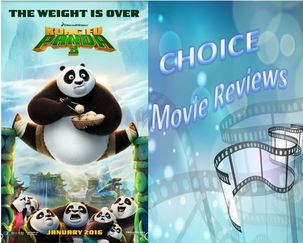
First, my score guide:
Quality: This score indicates entertainment value.
0 stars is horrible, while 5 stars is spectacular.
Political: This score addresses political messaging.
0 stars is aggressively anti-Conservative, while 5 stars is highly pro-Conservative.
Moral/Religious (M/R): This score addresses moral and religious messaging.
0 stars is either intensely immoral or all-out, needless assault on Christianity. 5 stars is either great moral messaging or highly pro-Christian.
Quality: This score indicates entertainment value.
0 stars is horrible, while 5 stars is spectacular.
Political: This score addresses political messaging.
0 stars is aggressively anti-Conservative, while 5 stars is highly pro-Conservative.
Moral/Religious (M/R): This score addresses moral and religious messaging.
0 stars is either intensely immoral or all-out, needless assault on Christianity. 5 stars is either great moral messaging or highly pro-Christian.
Kung Fu Panda 3
Quality – 3 stars, Political – 3 stars, M/R – 1.5 stars
Quality – 3 stars, Political – 3 stars, M/R – 1.5 stars
In “Kung Fu Panda 3” from DreamWorks Animation, Jack Black returns as Po, the bumbling but powerful martial arts Panda. Yes, he’s still klutzy. Yes, he’s still chubby—and stairs are not his friend. Leading a village of pandas against the vengeful Kai (an evil bull returned from the spirit realm—played by J.K. Simmons), Po remains a lovable hero.
Po’s personal story expands with the return of his biological father, Li (voiced nicely by Bryan Cranston). Clumsy like Po, Li was summoned by “the universe” to find his son and bring him back to the hidden panda village, high in the mountains. There, Po will discover what it means to be a panda. Naturally, Po’s adopted father, a goose named Mr. Ping (James Hong), is highly jealous of this paternal intruder. Thus ensues a tug-of-war, where kids eventually learn having an extra parent can have benefits too (a comforting message for today’s splintered culture).
But in this third entry, Po’s story ventures far beyond issues of family, training, and fighting, veering sharply into the supernatural. Much more than the first two films, this was a pretty intense tutorial in Taoist mysticism. Reeeeally Eastern-Religious. At one point, I’d swear the theatre doors locked behind us, as some old guy in a robe started burning incense. It was heavy, man. And yet, as spiritual as this movie got, its message actually lacked the profound impact we’ve grown to expect.
We all know the moral of the first film: “There is no secret ingredient.” In other words, stop looking for one missing element that will complete you, and start enjoying the collection of strengths you already have. This was a great message for kids, since our never-ending quest for “missing ingredients” can make us feel inadequate.
But this time, the message was, well, confusing. Sure, there was a nice dash of “Don’t make others be like you,” but the rest seemed hopelessly scattered. Here’s how Po’s training felt in “Kung Fu Panda 3”—and I’m not exaggerating:
“Master, how will I find strength to defeat the evil Kai?”
“Po, you must learn to be you! The best ‘you’ you can be! Strive for inner you-ness!”
“By following you?”
“Only you know the real you! Too much me will make you less you!”
“But—”
“Discover you in the inner you, thus releasing the power of your Chi!”
“And with my inner Chi, I’ll be strong enough to defeat—”
“Only if others contribute their Chi to yours!”
“But how—”
“Their hands will glow!”
“Wait…what?”
“You must help them achieve inner them-ness!”
“So they should follow me to learn the glowing hand thing that I don’t know?”
“Yes! I mean, no! Each must discover their own Chi! You shall help them as I’m helping you!”
“But you’re not helping.”
“Ahhhh…at last you see!”
“See what?”
“That your inner you-ness releases your Chi with no help from me as I guide you!”
“My head hurts—”
“And their inner them-ness releases their Chi with no help from you as you guide them!”
“—really hurting—”
“And somehow, it all just works out!”
“—of course it does. Ten aspirin, please.”
“All their Chi flows to your Chi, as your you-ness and their them-ness combines everyone’s Chi to battle Kai!”
“Who?”
“The villain!”
“Oh yeah. Does his Chi do the glowing thing?”
“Indeed it does! And he has stolen the Chi of many great warriors!”
“Chi seems pretty transferrable. Maybe I could just loan you mine—”
“Never!”
“But if you had everyone’s everyone-ness, that would make for one big batch of Chi, and—”
“Only the Dragon Warrior can wield that much Chi!”
“So the one guy who knows none of this stuff is destined to use everyone’s Chi—because it’ll just work out?”
“Exactly!”
“Word of advice, Master: Don’t ever become an evangelist.”
Please understand, there’s much to like in this movie. The artwork is breathtaking. The humor, while a step down from its predecessors, is still pretty good. All the pandas of the hidden panda village are ultra-cuddly, and the little ones are adorable.
Master Shifu (Dustin Hoffman) is witty and wise as always, while Tigress (Angelina Jolie) provides caring friendship from a fierce warrior. Monkey (Jackie Chan), Mantis (Seth Rogan), Viper (Lucy Liu), and Crane (David Cross) are more or less afterthoughts, but they provide some continuity from the earlier films.
And what of Kai? Is he a great villain? Meh—he’s okay. Oddly enough, though he poses the greatest threat Po has faced, no one seems to know who he is—or was—and he doesn’t feel as compelling as the first two villains. Thankfully, DreamWorks makes sure his Chi-stealing (where he basically takes his victims’ souls) isn’t too scary for young viewers.
Oftentimes with final sequels, writers seize upon their “last big chance” with these characters as an opportunity to preach. This was no different. Along with multiple sub-plots, the resulting Chi stew was emotionally unsatisfying—leaving me feeling nothing when the credits hit. By comparison, after the first “Kung Fu Panda,” I was buzzing for a week.
“Kung Fu Panda 3” will keep kids engaged for 1½ hours, so mission accomplished. But with all its supernatural talk, this beloved franchise appears to have lost its magic.
Po’s personal story expands with the return of his biological father, Li (voiced nicely by Bryan Cranston). Clumsy like Po, Li was summoned by “the universe” to find his son and bring him back to the hidden panda village, high in the mountains. There, Po will discover what it means to be a panda. Naturally, Po’s adopted father, a goose named Mr. Ping (James Hong), is highly jealous of this paternal intruder. Thus ensues a tug-of-war, where kids eventually learn having an extra parent can have benefits too (a comforting message for today’s splintered culture).
But in this third entry, Po’s story ventures far beyond issues of family, training, and fighting, veering sharply into the supernatural. Much more than the first two films, this was a pretty intense tutorial in Taoist mysticism. Reeeeally Eastern-Religious. At one point, I’d swear the theatre doors locked behind us, as some old guy in a robe started burning incense. It was heavy, man. And yet, as spiritual as this movie got, its message actually lacked the profound impact we’ve grown to expect.
We all know the moral of the first film: “There is no secret ingredient.” In other words, stop looking for one missing element that will complete you, and start enjoying the collection of strengths you already have. This was a great message for kids, since our never-ending quest for “missing ingredients” can make us feel inadequate.
But this time, the message was, well, confusing. Sure, there was a nice dash of “Don’t make others be like you,” but the rest seemed hopelessly scattered. Here’s how Po’s training felt in “Kung Fu Panda 3”—and I’m not exaggerating:
“Master, how will I find strength to defeat the evil Kai?”
“Po, you must learn to be you! The best ‘you’ you can be! Strive for inner you-ness!”
“By following you?”
“Only you know the real you! Too much me will make you less you!”
“But—”
“Discover you in the inner you, thus releasing the power of your Chi!”
“And with my inner Chi, I’ll be strong enough to defeat—”
“Only if others contribute their Chi to yours!”
“But how—”
“Their hands will glow!”
“Wait…what?”
“You must help them achieve inner them-ness!”
“So they should follow me to learn the glowing hand thing that I don’t know?”
“Yes! I mean, no! Each must discover their own Chi! You shall help them as I’m helping you!”
“But you’re not helping.”
“Ahhhh…at last you see!”
“See what?”
“That your inner you-ness releases your Chi with no help from me as I guide you!”
“My head hurts—”
“And their inner them-ness releases their Chi with no help from you as you guide them!”
“—really hurting—”
“And somehow, it all just works out!”
“—of course it does. Ten aspirin, please.”
“All their Chi flows to your Chi, as your you-ness and their them-ness combines everyone’s Chi to battle Kai!”
“Who?”
“The villain!”
“Oh yeah. Does his Chi do the glowing thing?”
“Indeed it does! And he has stolen the Chi of many great warriors!”
“Chi seems pretty transferrable. Maybe I could just loan you mine—”
“Never!”
“But if you had everyone’s everyone-ness, that would make for one big batch of Chi, and—”
“Only the Dragon Warrior can wield that much Chi!”
“So the one guy who knows none of this stuff is destined to use everyone’s Chi—because it’ll just work out?”
“Exactly!”
“Word of advice, Master: Don’t ever become an evangelist.”
Please understand, there’s much to like in this movie. The artwork is breathtaking. The humor, while a step down from its predecessors, is still pretty good. All the pandas of the hidden panda village are ultra-cuddly, and the little ones are adorable.
Master Shifu (Dustin Hoffman) is witty and wise as always, while Tigress (Angelina Jolie) provides caring friendship from a fierce warrior. Monkey (Jackie Chan), Mantis (Seth Rogan), Viper (Lucy Liu), and Crane (David Cross) are more or less afterthoughts, but they provide some continuity from the earlier films.
And what of Kai? Is he a great villain? Meh—he’s okay. Oddly enough, though he poses the greatest threat Po has faced, no one seems to know who he is—or was—and he doesn’t feel as compelling as the first two villains. Thankfully, DreamWorks makes sure his Chi-stealing (where he basically takes his victims’ souls) isn’t too scary for young viewers.
Oftentimes with final sequels, writers seize upon their “last big chance” with these characters as an opportunity to preach. This was no different. Along with multiple sub-plots, the resulting Chi stew was emotionally unsatisfying—leaving me feeling nothing when the credits hit. By comparison, after the first “Kung Fu Panda,” I was buzzing for a week.
“Kung Fu Panda 3” will keep kids engaged for 1½ hours, so mission accomplished. But with all its supernatural talk, this beloved franchise appears to have lost its magic.

 RSS Feed
RSS Feed